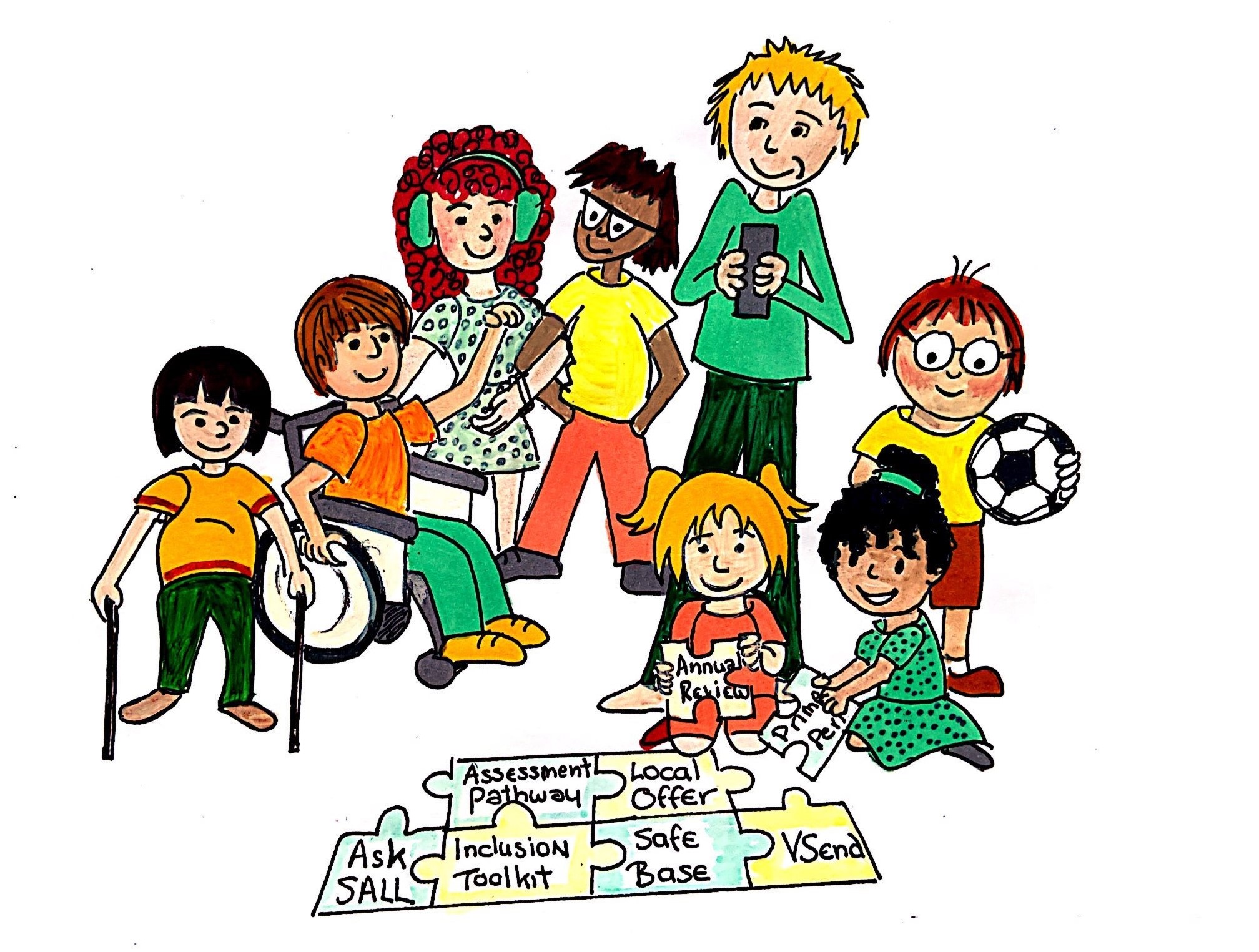Level 7-10 what you may notice
0-5
Level 7-8
Severe speech and language difficulties. These may be children who have speech and language difficulties alongside other areas of significant difficulty such as sensory or learning difficulties. The child will show a marked discrepancy in speech, language and communication skills on assessments completed by a speech and language therapist.
Understanding of language
- cannot understand or follow a simple instruction in context, For example, ‘come for snack’
- significant difficulties in understanding language for learning (conceptual language: size, time, shape, position)
- has persistent difficulties with inference, using non-verbal communication such as eye contact or facial expressions and sensory integration
Expressive (spoken) language
- limited functional communication skills
- frequent use of repetitive or echolalic speech
- severe difficulties recalling words with very limited attempts at starting to put words into sentences
Speech sound
- expressive language significantly delayed or impaired, showing a marked discrepancy with chronological age and other abilities as evidenced
- impaired and disordered speech sounds which have a profound impact on intelligibility, on the development of expressive language and the child’s ability to communicate effectively
- significant difficulties speaking and being understood by adults outside the family. Poor co-ordination of the tongue, lips and palate
Level 9-10
Severe and complex speech and language difficulties as above that also include other areas of significant difficulty such as sensory or learning difficulties.
Understanding of language
- severe communication difficulties, often presents as non-verbal
- beginning to lose skills
- does not understand conversational intention and content
Expressive (spoken) language
- child uses gesture or signing to communicate limited concepts
- little or no expressive language, pointing or signing
- persistent difficulties recalling any words with no age-appropriate sentence formation attempted
Speech sound
- does not speak recognisable words and communicates mainly through physical actions or becoming upset when distressed
- additional diagnosed verbal difficulties
5-16
Level 7-8
The pupil shows severe difficulties with expressive and/or receptive language that affects access to the curriculum. The pupil’s needs are met by working on an individual, bespoke curriculum and so has a highly personalised timetable that includes time spent away from the mainstream class. The pupil is able to access the classroom for limited periods where they are able to experience success supported by a member of staff. Planned opportunities are provided for the pupil to be included with peers where the pupil is able to experience success.
- standardised scores will fall below the 1st centile or below a standard score of 65 in at least one area of expression or understanding
- may be unable to engage with formal assessment
- has persistent difficulty understanding language in all contexts, including everyday conversation
- questions, instructions and conversations are usually misunderstood
- significant difficulty in processing language in a range of settings and contexts. For example, whole class, small group and some 1:1 conversations, impacting on accessing the curriculum. Attention is fleeting and is either unfocused or over-focused on a detail/object
- has persistent, significant difficulty in expressing themselves and understanding others
- has a very limited vocabulary that is not developing, and very poor generalisation of concepts
- uses sign language and communication book to assist most communication
- persistent and limited range of speech sounds, meaning that communication with unfamiliar adults or peers is very challenging
- communication augmented with sign language or communication book
- persisting and significant difficulties in phonological processing, impacting on literacy
- constant difficulty communicating verbally beyond basic needs
- frequently relies on a trained listener or family members for expressing themselves in any context
- frequent difficulties participating in social activities, even with familiar people and contexts
- frequently displays moderate distress, upset, concern, frustration, anger, embarrassment or withdrawal
- frequent difficulties participating independently in educational activities
Level 9-10
The pupil shows profound difficulties with expressive or receptive language that affects access to the curriculum. The pupil’s needs are met by working on a completely individual, bespoke curriculum and so they have a highly personalised timetable that necessitates 1:1 support to work towards specific targets set by specialists.
- very little or no indication that language or visual communication aids are understood, impacting on every aspect of daily life
- delayed understanding and persistent difficulties recognising instructions in a range of settings
- difficulties severely affect curriculum access and social development
- needs are difficult to interpret, even by familiar adults
- can only communicate a very limited range of words or concepts (For example, choices between options)
- all communication via body language, emotions and alternative forms. For example, communication book, facial gestures, eye-pointing, body movements
- speech is largely unintelligible even in context or with familiar adults, with frequent use of echolaic language and speech system reduced to a few sounds
- has severe speech or language delay or disorder
- standardised test scores fall below the first centile or below a standard score of 65 in all areas of language assessment
- pupil may be unable to engage with formal assessments
- in addition, one or more of the following also applies:
- minimal functional communication limited to expressing basic needs, usually requiring tailored use of Augmentative and Alternative Communication (AAC)
- constant dependence on trained or familiar communication partner
- profound difficulties participating in educational and social activities
- difficulties responding to external support to control emotions. A tailored and structured approach to emotional support is required.
- frequently displays high distress, upset, concern, frustration, anger, embarrassment or withdrawal
- unable to express or control emotions appropriately
- an Education Health and Care Plan (EHCP) will be in place to recognise the pupil’s needs and the provision required to meet them


